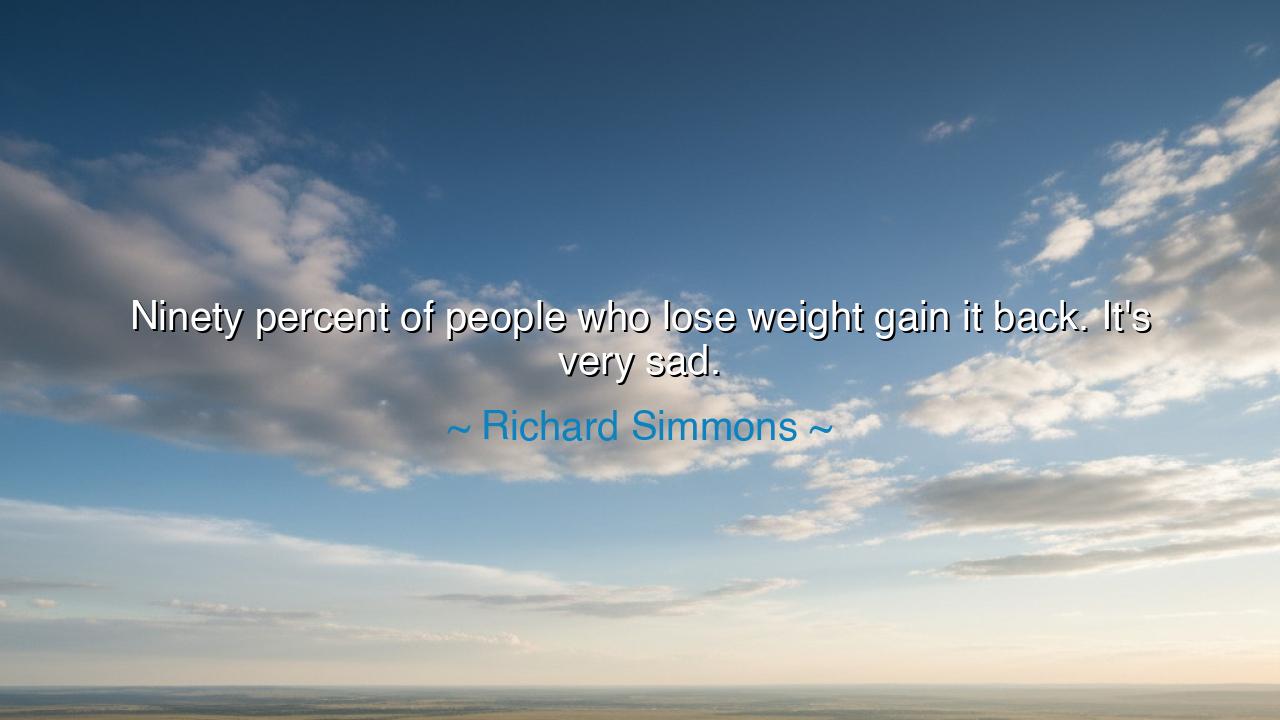
Ninety percent of people who lose weight gain it back. It's very






Hearken, children of reflection, to the words of Richard Simmons, who laments: "Ninety percent of people who lose weight gain it back. It's very sad." In these words lies a meditation upon human struggle, perseverance, and the fleeting nature of certain victories. Since the days of the ancients, philosophers and physicians alike have observed the difficulties of sustaining discipline and the inevitability of human frailty, teaching that true wisdom lies in understanding the patterns of effort, endurance, and the need for long-term commitment.
The ancients understood that transformation, whether of body or mind, is not accomplished by mere desire but by sustained practice. Hippocrates and Galen taught that health is a balance, cultivated through consistent habits and moderation. Simmons’ observation that most people who lose weight eventually gain it back reflects this eternal truth: short-term victories, while celebrated, are fragile unless rooted in a deep understanding of lifestyle, discipline, and enduring care. The sadness he perceives is not merely for the numbers, but for the dashed hopes and repeated struggle of human effort.
Consider the life of Diogenes of Sinope, who sought simplicity and self-mastery amidst the distractions of Athens. While he maintained discipline in asceticism, many around him pursued fleeting pleasures, failing to sustain their efforts. Like those who struggle with weight loss, individuals often begin with enthusiasm but falter without an integrated approach, showing that will alone is insufficient. Simmons’ words echo this ancient pattern: human nature must be met with strategy, support, and realistic understanding of limits.
The quote also illuminates the emotional weight of repetitive failure. The sadness Simmons evokes arises from empathy, witnessing the disappointment of those caught in cycles of effort and relapse. The ancients recognized that human endeavor is intertwined with emotion: the ethical and psychological dimensions of action affect perseverance. As Aristotle would counsel, cultivating virtue—and by extension, health—is as much about the disposition of the heart as the regulation of the body.
Furthermore, Simmons’ statement underscores the importance of sustainable transformation rather than temporary change. To merely lose weight is insufficient if the underlying habits, mindset, and balance of life are not addressed. Historical figures, from military leaders to philosophers, understood that the sustainability of change distinguishes the wise from the impetuous: strategies must be integrated into daily life, not treated as episodic triumphs.
From this reflection emerges a timeless lesson: endurance, consistency, and realistic strategies are essential for meaningful transformation. Simmons teaches that the human struggle is compounded by the impermanence of victories, and that guidance, support, and habit formation are central to lasting success. True change is neither rapid nor superficial; it requires attention to both body and mind, balance and discipline, intention and practice.
Practical actions follow naturally. When pursuing change—whether in health, knowledge, or virtue—set sustainable goals, cultivate supportive environments, and build habits that endure beyond initial enthusiasm. Accept that setbacks may occur and treat them not as failure but as feedback. Engage in daily practices that reinforce long-term balance, recognizing that true transformation is gradual, continuous, and resilient.
Remember, children of the ages, that human aspiration is both noble and fragile. Richard Simmons’ words illuminate the eternal truth that fleeting triumphs, like temporary weight loss, may be undone without sustained effort and understanding. By embracing discipline, compassion, and realistic strategies, we cultivate resilience, wisdom, and enduring success, transforming sadness into insight and repeated struggle into lasting growth.






AAdministratorAdministrator
Welcome, honored guests. Please leave a comment, we will respond soon